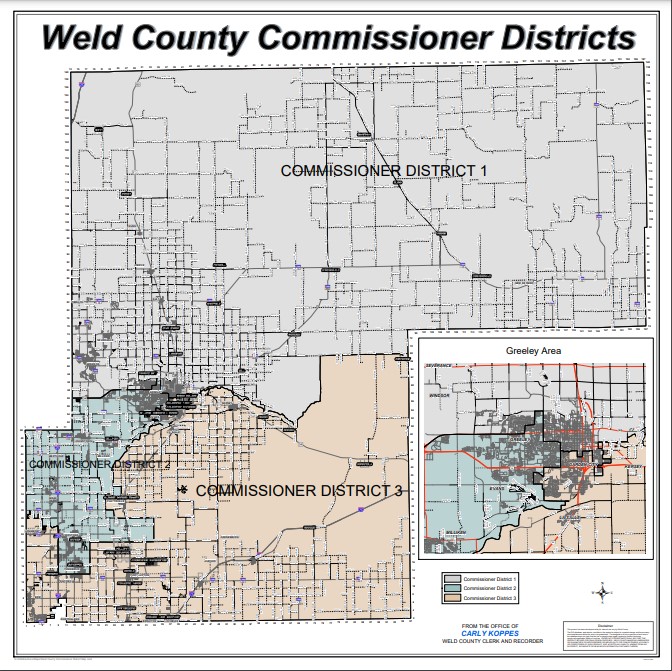By Chris Bolin, The Greeley Tribune
Weld County commissioner district lines will need to be redrawn after a Weld district judge ruled that the board of commissioners failed to comply with a state law against gerrymandering when redistricting early last year.
Judge Todd Taylor prohibited the district map adopted March 1 from being used in any upcoming elections and ordered the board to begin a redistricting process, according to the order handed down Friday.
In the lawsuit filed Oct. 23, the plaintiffs — the League of Women Voters of Greeley and Weld County, along with the Latino Coalition of Weld County and two Weld County residents — alleged the commissioners acted in violation of state House Bill 21-1047 by not providing proper public notice of hearings on the redistricting process and by improperly drawing a map that divided a community of interest.
H.B. 21-1047, titled “County Commissioner Districts Gerrymandering,” requires counties with commissioner districts to create redistricting commissions that must follow a process that encourages transparency, outreach and feedback as well as follow criteria for the new districts. Criteria include preserving communities of interest and political subdivisions as well as maximizing the number of competitive districts.
In his order Friday, Taylor said the board of commissioners “failed to meet nearly every procedural requirement” of the law — echoing a statement Colorado Attorney General Phil Weiser wrote in an amicus brief filed Jan. 24 encouraging Taylor to rule for the plaintiff.
The map was initially presented to commissioners in January 2023 during a public work session in which no residents were present. The lawsuit argued proper notice of the meeting was never given.
The commissioners posted only two public notices about redistricting in a small font in the Greeley Tribune, made publicly available only one map, allowed for inspection of the map at only the office of the Clerk of the Board of Commissioners and received public feedback at only one hearing — the same one in which the only proposed map was approved.
The county received nearly 50 written comments opposing the proposed redistricting and just one written comment in support — yet the map was approved during the panel’s regular meeting March 1.
The map the commissioners approved moved three precincts in Longmont and Dacono from District 2 to 3 but kept the city of Greeley — which is 40% Latino — divided into three different districts. Weld County as a whole is about 30% Latino.
“By dividing Greeley into the maximum number of districts possible, the Defendants’ map facially dilutes the voting power of Weld County’s urban voters and Latino voters,” Weiser said in the amicus brief. “The absence of a record demonstrating non-partisan reasons for Greeley’s subdivision leaves open the reasonable inference that the map improperly divided Greeley voters into three districts for political purposes.”
Weld County Commissioners Kevin Ross, Perry Buck and Scott James all suggested that splitting Greeley across the three districts helps foster a good mix of urban and rural interests in getting representation at the county level.
Weld County also raised the county charter as a defense. The charter requires the commissioners to revise districts so that they are “as nearly equal in population as possible.”
This doesn’t conflict with state law, which requires “a good-faith effort” for equally sized districts with population differences of no more than 5% between the most populous and least populous districts.
In his order Friday, Taylor said that the board “insisted that they are governed only by the Weld County Charter and Weld County Code rather than Colorado State Law,” referencing their process in handling the redistricting.
Weld County Attorney Bruce Barker argued the county didn’t have to follow the state law because of its status as a “home rule” county governed by its own charter, and that home rule counties weren’t specifically named in the 2021 bill.
Rep. Chris Kennedy, D-Lakewood, who sponsored the bill, said last March it was “absolutely intended to apply to home rule counties, as the Weld County Commissioners knew from the conversations we had about it at the time.”
Taylor agreed with Kennedy, saying, “it is clear beyond all reasonable doubt that the General Assembly intended to regulate the redistricting process in counties such as Weld County.”
A document about the bill prepared by the Legislative Council Staff named Weld County as one of three counties affected by the legislation. Weiser said the other two — El Paso and Arapahoe — followed the new redistricting requirements.
Though home rule counties have more authority over local governance matters that other counties, Weiser said the Colorado Constitution and state laws limit what matters home rule counties have authority over, and that does not include redistricting.
This opinion matches with a February 2021 legal opinion from the Office of Legislative Legal Services indicating the law would apply to home rule counties.
The board of commissioners did not wish to speak on the lawsuit until it figures out its next step.
“The county is evaluating the ruling regarding the steps forward, including a possible appeal,” Weld County Public Information Officer Jennifer Finch said in an email. “Once the board of commissioners and Clerk and Recorder Carly Koppes have been advised of the options and make a decision, they will be able to discuss.”

